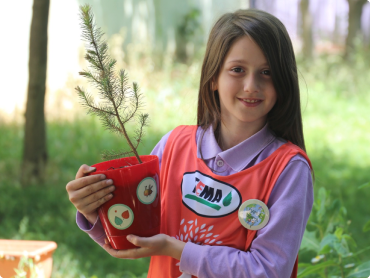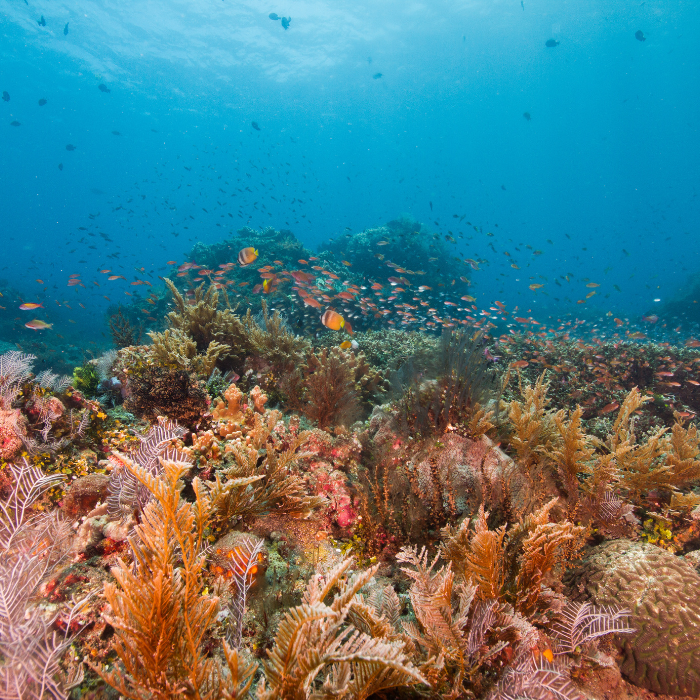On May 22, International Day for Biological Diversity, the TEMA Foundation drew attention to the negative effects of human activities on the diversity of living things in the world. Ms. Deniz Ataç, Chairperson of the Board of Directors of TEMA Foundation, said, “It is predicted that 99% of the corals that host marine biodiversity will disappear in a warming of 2°C” and listed the steps to be taken to stop the destruction and rebuild biodiversity.
This year's theme of International Day for Biological Diversity, which is celebrated by the United Nations (UN) on May 22 every year, is "From Agreement to Action: Build Back Biodiversity."
77% of terrestrial ecosystems and 87% of seas are under human influence
Ms. Deniz Ataç, Chairperson of the Board of Directors of TEMA Foundation, underlined that all living things and ecosystems in the world interact with each other and said, “Today, many important agricultural products such as fruits, vegetables, coffee, cocoa, almonds, cherries, plums, figs, quince and apples are produced with the contributions of bees and numerous insect species. Wastes are recycled in nature with decomposing organisms, and pollution is prevented. Creatures in marine and terrestrial ecosystems take back 60% of annual human-induced carbon emissions from the atmosphere.”
Stating that today's human activities threaten the right to life of living things in the world, Ms. Deniz Ataç said, "Today, 77% of terrestrial ecosystems and 87% of the seas, excluding glacial areas, are under human influence. Unfortunately, although its vital importance for the planet and humanity is undisputed, due to intense urbanisation, mining, destruction of natural areas, destruction of wetlands, water and air pollution, forest fires, uncontrolled and intensive use of agricultural chemicals (pesticides), unconscious hunting, climate crisis and the invasive species we unwittingly infect the nature, biodiversity is rapidly disappearing.”
If warming continues carols will completely go extinct
Noting that according to the UN climate change estimates, 41% of land-dwelling mammals may lose half of their habitat as a result of global warming of 3°C, Ms. Ataç said, “In marine ecosystems, which are more fragile than the terrestrial climate, coral reefs have decreased by almost half in the last 150 years due to the climate crisis and environmental pollution. In the 6th Assessment Report of 2023 published by the UN Intergovernmental Panel on Climate Change (IPCC), it has been definitively determined that human activities have disrupted the balance of the world's atmosphere, caused an increase in the global average temperature, which disrupted the existing ecosystem balance and threatened a large part of living species.”
In our country hosting unique diversity, the protected areas are not enough
Referring to Türkiye’s position in biodiversity, Ataç said, "Our country, which is one of the rare countries on three important plant geographies, is rich enough to host as many species diversity as a continent has. Home to nearly 12,000 plant species, of which 3,497 are endemic, Türkiye is unique compared to the European continent in terms of habitat diversity, in parallel with its richness in terms of species. However, the number and size of protected areas in Türkiye are not directly proportional to ecosystem and species diversity. The ratio of protected areas to the country's surface area is approximately 8.69%. Moreover, there are deficiencies and conflicts of authority in the nature protection legislation of Türkiye. Despite the high diversity Türkiye has and the increase in protected areas in recent years, our country ranks 178th out of 180 countries in the biodiversity and habitat category in the world. While this situation reveals that great efforts should be exerted to protect the biological diversity in Türkiye, the 16th UN Conference of the Parties to the Convention on Biological Diversity, planned to be held in Antalya in 2023, provides an opportunity to take the first big step in this regard.
The share of protected areas should reach 30%
Listing the steps to be taken to build back the lost biodiversity, Ataç said, “The use of fossil fuels should be abandoned, and the use of renewable energy resources should be expanded. Land destruction must be prevented, and very strict protective measures must be adopted against land destruction. Restoration works should be carried out on the destroyed lands, and incentives should be provided to contribute to these actions. Sustainable forestry, sustainable rangeland management and agricultural activities should be expanded. Afforestation and erosion control actions should be carried out with natural species, overfishing in the seas should be prevented, and activities such as plant collection that cause loss of species should be controlled. Consumption habits should be changed, and it should not be forgotten that each consumption is a burden on nature," and emphasised once again that the rate of protected areas should be increased to the level of 30% as set in the United Nations resolutions.
Ataç said, “It should not be forgotten that the destruction we create in nature today means a bad legacy that will limit the lives of future generations. The way to remove these traces is to protect the natural environments in which each living thing lives, to restore the destroyed ecosystems and to leave a more liveable world to future generations.”
We are raising hope! TEMA Foundation




